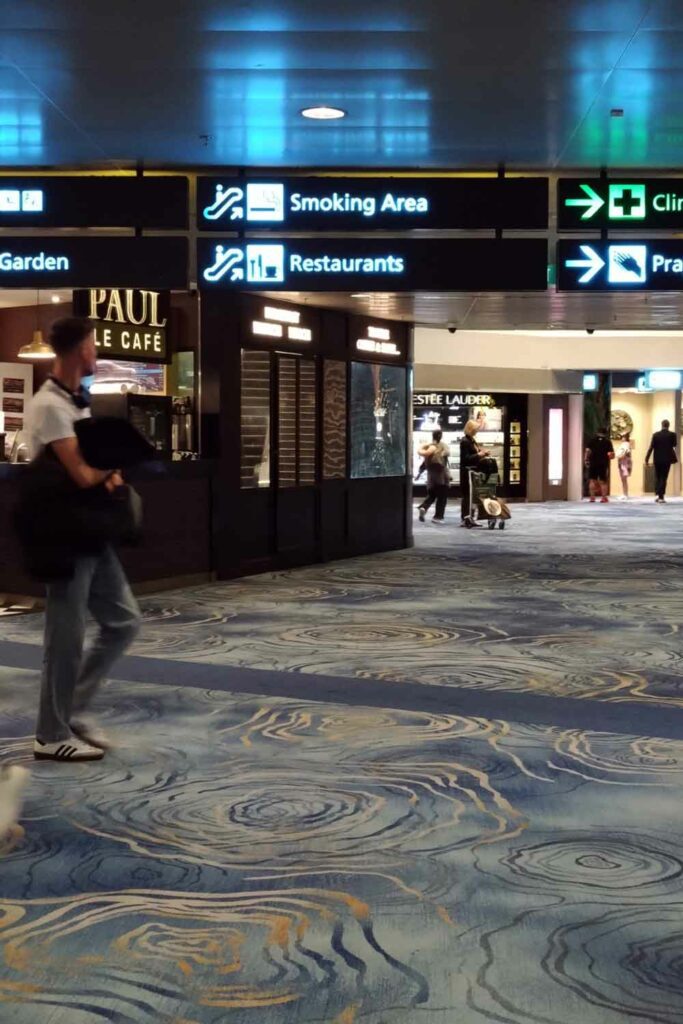The View From Down Under
- Also in TR
- July 17, 2024
- 0
- 12 minutes read


(Photos: George Gay)
Impressions from Australia, one of the world’s most hostile countries for the nicotine business.
By George Gay
It is my belief that luggage is evolving at a faster rate than the travelers who use it. At least this was the main observation I made while people-watching at the end of May as I waited to complete the formalities necessary before I could board my flights from Britain to Australia via Singapore. Luggage, seemingly to suit every conceivable travel need, was being carried, dragged, rolled and even ridden by travelers, most of whom it was difficult to imagine fulfilling any need. Frankly, these travelers looked devoid of agency as they moved robotically, heads lowered, slavishly submitting to the instructions being delivered by the cell phones they wrongly believed were acting in their service.
There was a time when it was said that people came weighed down with baggage of one sort or another, but now, it seems, luggage comes lumbered with human baggage. But for how much longer I wonder? Surely it would be more humane to cut out the middleman and woman and let the luggage, suitably AI enchanced, go traveling on its own, relaying its tourist or business experiences back to its owners safely ensconced at home. Given an AI uplift, luggage could certainly negotiate better than humans the automated bag-drop formalities at London airport and the immigration computers in Sydney. After all, it would be interacting with its own kind in a way that humans no longer do.
Why do people travel to other countries? Is it, as I have sometimes heard, “to broaden the mind?” Perhaps this was once true, but it is looking increasingly threadbare as a reason or excuse. Nowadays, with high-speed travel the norm, flying is more likely to cause jetlag, damaging the brain and draining the mind of memory, and, in any case, all the information you need to know about far-away places is available to you while sitting at the kitchen table with a computer and a cup of coffee.
But perhaps, as I have also heard, people travel “to get away from it all?” Well, I’ve got news for the people who think that way. Globalization and modern communications have conspired to make it impossible to get away from it all, except for the weather, if that is what you mean by “it all.” These days, people are incapable of getting away and enjoying new vistas because they are trapped within the horizons set by their phones or limited by their mental baggage.
Once in Australia, I did try to get away from it all by reading various newspapers, but, after a while, I found myself buying each day the same paper, the Sydney Morning Herald (SMH), whose world view seemed to be aligned with the newspaper I read in the U.K., The Guardian. It was comforting, too, that the letter writers to the SMH seemed to share the same, generally caring attitudes exhibited daily in the pages of The Guardian.
And soon I realized that not only was I reading a paper with similar views but also that the news itself was little different to what I had thought I had left behind. There were reports of housing shortages, debates about immigration and concerns about energy provision and the climate crisis and about a cost-of-living crisis that meant less money was being donated to charities. Violence against women was in the news as was a lack of care facilities for the elderly, waiting times for medical treatment, a lack of some prescription drugs, increasing cases of whooping cough, a rising need for food banks, infrastructure cost overruns and bird flu. I had left a relatively rich country where child poverty levels were scandalously high and arrived in another relatively rich country to be greeted by an advertisement for The Smith Family’s Winter Appeal in which it was stated that one in six Australian children lived with poverty.
But it wasn’t all the same. I couldn’t help noticing, for instance, that whereas magpies in the U.K. mostly issue harsh, scolding cries, in Australia, they are more melodious. Perhaps the incidence of passive smoking among magpies is higher in the U.K., a more crowded country than Australia.


At Singapore airport (left) there are comfortable smoking areas in the terminal, but, at Sydney, smokers and vapers are out in the cold and dark.
Confused and Conflicted
Australia and the U.K. have different approaches to tobacco smoking and trying to ensure the safety and health of their citizens more generally, but both approaches, in my opinion, are often confused and conflicted. Australia seems to be trying to take a comprehensive view when warning of the dangers of certain activities, so, for instance, televised public health announcements call on Australians to beat cravings, one at a time. But such announcements, like the adverts they mimic, work only if they create a craving—In this case, a craving to live a healthier lifestyle. Not all cravings are bad—some are essential for life.
And even if the people responsible for public health announcements don’t feel they are conflicted, some of those hearing the messages might well feel that way. Announcements about the use of cameras to make sure that drivers are wearing their seat belts are no doubt well-meaning but might run into opposition from those on the libertarian wing of society. And I would imagine there will be a long debate over the calls being heard for social media health warnings.
In Australia, with long stretches of little-used country roads, it was common while I was there to see on television public health announcements warning drivers to be careful when approaching train level crossings. But, at the same time, you can see roadside hoardings advertising beer, and it cannot but cross one’s mind that perhaps if the hoardings were taken down, there would be less need for the railway crossing safety warnings.
Beer advertisements appear on television during the breaks in broadcasts of football games, where presenters sometimes seem blokeish to the point of caricature. But on the other hand, alcohol in Australia is not sold alongside food in supermarkets as it is in the U.K., and I guess you could argue until the cows came home what it is that normalizes drinking in the minds of the young—its connection with sport and blokeishness or its connection with supermarkets and the everyday.
Gambling advertisements on television seem to come with their own warnings. At least one advertisement I saw ended with a written suggestion that those watching should imagine what other things money destined for gambling could be spent on. But are such warnings effective? An SMH piece by Charles Livingstone, a gambling researcher and associate professor at Monash University, seemed to suggest not and to show up the conflict of interests that abound when habits are risky to those who partake of them but profitable to those who make them available.
“But whatever happens, the cozy relationship between gambling, sport, government and broadcasting is as solid and entrenched as it could be,” he wrote. “The damage to the community, especially young people, and to the integrity of sport appears to matter little when everyone’s pockets are full.” Everybody’s pockets but those of most of the gamblers, I presume.

Relative Risks
One of the visits I made in Australia was to a long-standing friend who many years ago concluded that people were evolving in the direction of becoming more stupid and who seems not to have changed his mind. Is he right, I wonder? In Queensland one day, sitting at a delightful pavement cafe just across from a beautiful beach, the driver of a large utility vehicle parked in front of the cafe, started the vehicle’s engine and then got out of the cab and proceeded to perform a few tasks, including tying down his load. Predictably, the wind off the sea wafted the diesel fumes over the diners, but nobody seemed to mind, and I wondered what level of fuss those people would have made if somebody had started to smoke or vape. Are people stupid? Some certainly don’t seem to understand risk.
Well, certainly relative risk. But then, can you blame them? A public health broadcast on television showed a youngish man from the 1970s smoking and coughing up blood, followed by a contemporary image of a youngish man vaping and coughing up blood. The message was clear. There was no difference between smoking and vaping. The risks were the same. Are people stupid? Perhaps the question should be: Are they being encouraged to be stupid?
Australia seems to have had and to have a strange relationship with tobacco and nicotine. The country can claim to be the birthplace of graphic warnings on tobacco products, and I saw very few people smoking or vaping while there, but tobacconists, sometimes sophisticated-looking businesses selling “smokes and vapes,” were highly visible on high streets and in malls, so I guess there is a reasonable demand for their products. These tobacconists seemed not to be overrun with customers when I looked in, however, partly, I take it, because of the significant illegal trade in tobacco and nicotine products, which was the subject of at least one television news report while I was in the country.
One tobacconist I came across was called a Tobacco Station, and, as I understand it, after I left Australia—and with a nod to the Australian poet and journalist Banjo Paterson, perhaps—there has been movement at the station. From July 1, all nicotine vapes in Australia have been regulated as therapeutic goods, so smokers wanting to buy vapes have had to do so from pharmacies. But, from Oct. 1, those over 18 will no longer have to comply with the government’s much-criticized requirement and find a doctor willing to give them a prescription for vapes—at least those up to a maximum nicotine content of 20 mg per mL. I am sure there will be much debate about how wise such moves are—how smokers and vapers will react.
Is there a lesson here? Has the nicotine industry helped to bring about this move? Given that it always emphasizes the uniquely therapeutic roll of vaping as providing a safer substitute for smoking, the sale of vapes in pharmacies only has a certain logic. As I have said before, it is long overdue that the industry jettisons this baggage and accepts publicly that vaping is a habit separate from, but similar to, smoking (and drinking)—one that will attract some people who have never smoked. It is a consumer product not a medicine.


